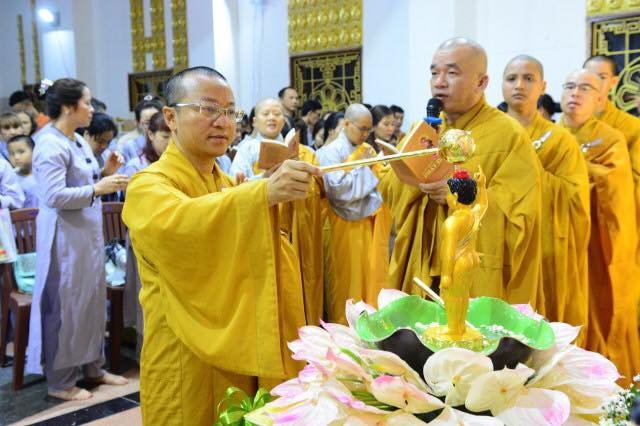Deeply understanding the ritual of Bathing the Buddha is a purification process that brings us closer to the transcendent nature of enlightenment, says Ven. Thích Trí Quang.

Venerable Thích Nhật Tử performs a sacred ritual of Buddha bathing at Giác Ngộ Pagoda in Hồ Chí Minh City. Photo courtesy of http://phapluat.vn
Every year, in celebrating the Buddha's birthday, all pagodas nationwide perform the ritual of Bathing the Buddha and reading the verse of Buddha bathing and the sutra on the Merit of Bathing the Buddha.
Understanding the deep meaning of this sacred ritual will deliver invaluable benefits to the spiritual aspirant.
Indeed, understanding the wisdom and virtue of the Buddha brings us closer to dissolving the distance between Samsara, the material world and the Buddha, which is the true nature of reality.
And gradually, we will also understand that penetrating the Buddha realm will enable things beyond human thought and imagination.
Infiltrating this realm is to cultivate the Buddha mind and attain Buddhahood. We move out of our material, calculating desires. When this happens, the Buddha supports us and tells the Dharmapala, the protector, to support us, leading to results beyond our normal ability.
An anonymous patriarch having a profound sense of the Buddha's immortal life, composed the verse of Bathing the Buddha. A Tang poem, it has three passages, each with four sentences.
This poem is written in the Han Chinese script, so some people can read it, but few can understand it. I am translating it (into Vietnamese) so that everyone can understand the noble will of Tathagata, the austerity path to achieve inconceivable results:
"We are now coming up to bath the Tathagatas
"For accumulating purity, wisdom, dignity, merit and virtue
"May all sentient beings be rid of impurity
"And all realise the pure entity of the Tathagatas
"Neither was Buddha born in Kapilavastu,
"Nor did he passed away between two Sala trees in Kushinagar.
"The true Buddha has neither birth nor death.
"Worthy of the master of the Samsara realm.
"Today is the eighth day of the fourth month - the Vesak day
"We celebrate the birthday of our historical Buddha.
"To welcome him, from the sky, nine dragons spray water to bathe his body
"Every step he walks, from the earth springs a lotus to cushion his feet."
The Patriarchs teach us that the water for bathing Buddha must be taken from our true nature, or from our unconscious, our selflessness.
The Eight Virtues of Merits water is born from true nature. It has the miraculous power of being able to wash our unclean karmic body and cleanse our suffering mind.
This merit water comes from our cultivation of the right Dharma. Taking clean water and combining it with our pure mind and merit will help us realize the Dhamma, the doctrine of the Buddha.
In the ritual of Buddha bathing, the material statues are not spiritual, but combining the belief and sincerity of people, it becomes magical, and we see that the statue in the water is Tathagata standing on the lotus.
Thus the ritual is transformed into an accumulation of purity, wisdom, dignity, merit and value, and a prayer that all sentient beings are rid of impurity to realise the true nature of the Tathagatas (one who is beyond all coming and going – beyond the circle of life and death).
History records that the Buddha was born in Kapilvastu and died in Kushinagar, but why does the verse say that he neither took birth nor died?
The Buddha’s true nature is of non-birth and non-death, but because we are ignorant and prevented by delusions, we see that Buddha is born and passes away. It is a simple understanding, but its nature is maya, an illusion.
Because we live in this illusion, the Buddha must also embody in this world to save us. If he does not appear in life, how do we know who the Buddha is? The Buddha becomes flesh and bones to help us understand the true nature of existence.
The Buddha mind is placed in the body of Prince Siddhartha in order for us to learn and understand that the true Buddha is neither born, nor does he die. This realization breaks the infinite cycle of life and death and takes us to Nibbāna, or enlightenment.
On the path of cultivating the Buddhahood, we consider the body a temporary refuge to create good merits. Borrowing the five aggregates that the body is, it is important that we take refuge in the Dharma, follow the practice of Buddhism, rely on our bright teachers to help us become a Bodhi and create other good luck.
In celebrating the Buddha's birthday, I would like to pray for all monks and nuns, for all Buddhists that they constantly focus on the Buddha's immortality, living with the immortal, eternal Sambhogakaya and build up a peaceful Pure Land right in this world. — VNS
OVietnam